- Home
- Robin Hobb
Shaman's Crossing ss-1 Page 2
Shaman's Crossing ss-1 Read online
Page 2
I knew he was a scout, for his dress was half-soldier and half-plainsman. He wore dark-green cavalla trousers like a proper trooper, but his shirt was the loose linen of a plainsman, immaculately clean. His hair was not cropped short in a soldier’s cut nor did he wear a proper hat. Instead, his black hair hung loose and long and moved with his white kaffiyeh. A rope of red silk secured his headgear. His arms were bare that summer day, the sleeves rolled to his biceps, and his forearm was circled with tattooed wreaths and trade-bracelets of silver beads and pewter charms and gleaming yellow brass. His horse was a good one, solid black, with long straight legs and jingle charms braided into his mane. I watched him with intent interest. Scouts were a breed apart, it was said. They were ranked as officers, lieutenants usually and frequently were nobly born, but they lived independent lives, outside the regular ranks of the military and often reported directly to the commander of an outpost. They were our first harbingers of any trouble, be it logjams on the river, eroding roads or unrest among the plains-people.
A girl of twelve or thirteen on a chestnut gelding followed the scout. It was a smaller animal with a finely sculptured brow that spoke of the best nomadic stock. She rode astraddle as no proper Gernian girl would, and by that as much as by her garb I knew her for a mixed blood. It was not uncommon, though still deplored, for Gernian soldiers to take wives from among the plainspeople. It was less common for a scout to stoop so low. I stared at the girl in frank curiosity. My mother often said that the products of cross-unions were abominations before the good god, so I was surprised to see that such a long and ugly-sounding word described such a lovely creature. She was dressed in brightly layered skirts, one orange, one green, one yellow, that blossomed over the horse’s back and covered her knees, but not her calves and feet. She wore soft little boots of antelope skin, and silver charms twinkled on their laces. Loose white trousers showed beneath her bunched skirts. Her shorter kaffiyeh matched her father’s and displayed to advantage the long brown hair that hung down her back in dozens of fine braids. She had a high, round brow and calm grey eyes. Her white blouse bared her neck and arms, displaying the black torc she wore around her throat and a quantity of bracelets, some stacked above her elbows and others jingling at her wrist. She wore the woman’s wealth of her family proudly for all to see. Her naked arms were brown from the sun and as muscled as a boy’s. As she rode, she looked round boldly, very unlike my sisters’ modest manner and downcast eyes when in public.
Her stare met mine, and we exchanged looks of honest appraisal. She had probably never seen a noble’s soldier son, and I stood a bit straighter, well aware that I was finely turned out in my dark green trousers and crisp blouse and black boots, and especially so in the company of the ragged street-jay boys. I was not so young that the attention of a girl was not flattering. Looking back, perhaps it annoyed the others that she looked so intently at me for they stared at her like hungry dogs studying a plump kitten.
She and the scout dismounted outside the same building that my father had entered. The scout had a clear, carrying voice, and we all heard him tell her that he would join her as soon as he’d delivered his report to the commander. He gave her some coins and told her she might go down the street to the bazaar and get some sweets or fresh caralin juice or ribbons for her hair, but not to go beyond the line of stalls there. “Yes, Papa. I will.” She promised her father quickly, her eagerness to get to the market evident in her voice. The scout glanced over at my cluster of lads and scowled at us absent-mindedly, and then hurried up the steps into the command quarters.
His daughter was left alone in the street.
In such a circumstance, I know my sisters would have been terrified. My parents would never have left Elisi and little Yaril in a barracks town without an adult chaperone. I wondered if her father did not care for her. Then, as she strode smiling down the street, heading past the knot of boys and toward the vendors’ stores on the market square just outside the outpost gates, I saw that she was not frightened or cowed in the least. She walked with confidence and grace, intent on exploring the many delights of the bazaar. My gaze followed her.
“Look at her, will you?” one of the older boys hissed to his friend.
Raven grinned knowingly. “That hinny’s tamed. See that iron thing round her neck? Long as she wears that, her charms don’t work.”
I looked from one leering young face to the other, confused. “Her charms?” I asked.
It was flattering when Raven deigned to notice me. “Little silver jingly things, woven in her hair, supposed to protect her. Plains magic. But someone tamed her. Put an iron collar on a plainswoman, and she can’t use her charms against you. She’s ripe for the picking, that hinny is.”
“Picking what?” I boldly asked. There was no hinny to be seen, only the girl walking past us. I was confused and resolved to get an explanation. I did not know at that time that my bold assumption of not only equality but superiority to these sons of common soldiers would be resented by the older boys. Raven brayed a laugh out, and then said to me earnestly, “Why, to picking out her friends, of course. You seen how she looked at you? She wants to be your friend. And you want her to be friends with us, right, ’cause we’re your friends, too. Whyn’t you just go out there and catch her by the hand and lead her back here to us?”
Raven’s voice was sugary, but his words fell somewhere between a compliment and a dare. As he spoke, he gestured to the other boys, and they all retreated more deeply into the alley between the buildings. I stared up at him for a moment longer. His cheek was downy, and the fine hair held the dust of the street. The corners of his mouth were caked with dust that had been trapped there by stray, sticky crumbs. His hair was shaggily cut, his clothing dirty. But he was older than I was, and he’d been playing with a knife, and thus I yearned to distinguish myself in his eyes.
The girl walked like a gazelle going down to water. She was intent on her quest, and yet both wary and aware of what was around her. She did not look at us, but I knew she had seen us. She probably knew we were talking about her. I darted out a few steps into the street to intercept her, and when she looked at me, I smiled at her. She smiled down at me. It was all the encouragement I needed. I hurried up to her, and she halted in the street.
“Hello. My friends want you to come and meet them.” Such an ingenuous way for me to greet her. I had no idea I was leading her into a vile trap.
I think she did. She looked past me at the loitering boys inside the alley mouth, and then back at me again. I hope she saw I was innocent of their scheme. She smiled again but her words dismissed me. “I don’t think so. I’m going to the market. Goodbye.” Her voice was clear and unaccented, and obviously intended to reach my playmates’ ears.
They heard her words and saw how she strode off. One of my erstwhile companions gave a catcall and Raven laughed at me. I couldn’t stand it. I ran after her and seized her hand. “Please? Just come over and say hello.”
She did not react with alarm, or take her hand from mine. She considered me kindly for a moment and then offered, “You’re a friendly little cub, aren’t you? Why don’t you come to the market with me instead?”
Her invitation instantly attracted me more than the company of the boys. I loved going to market almost as much as my sisters did. Exotic goods and trinkets demanded to be handled and explored. Market food was always exciting; I loved plains food, the spicy root-paste rolled in terna seed, sweet and peppery meat sticks, and little buns of salty ember-bread, each with a lump of carrada in the middle. My gaze met her grey eyes and I found myself nodding and smiling. I forgot the boys and their stick-knife game. For the moment, I ignored the knowledge that not only Parth but also my father would disapprove of me wandering off with a half-breed plainsgirl to saunter through the market.
We had gone less than five paces when my earlier companions suddenly ringed us. They were smiling, but their grins were wolfish, not friendly. Raven stood directly in front of us, forcing us to stop. Carky,
his cut foot tied with a rag, stood at Raven’s elbow. The girl’s fingers twitched in mine, and as clearly as if she had voiced it, I felt the little jolt of fear that shot through her. My half-formed honour came to the fore and I said importantly, “Please step out of our way. We are going to the market.”
Raven grinned. “Well, listen to him! We’re not in your way, colonel’s son. In fact, we’re here to guide you. There’s a short cut to the market. We’ll show you. Right down that alley.”
“But I can see the market from here!” I protested stupidly. The girl tried to take her hand from mine, but I held on tightly. I suddenly knew my duty. A gentleman always protected women and children. I instinctively knew that these fellows meant my companion some sort of harm. Innocent as I was, I did not know what they intended for her, or perhaps I would have been more sensibly frightened. Instead, I only grew more determined to guard her. “Step out of our way,” I commanded them again.
But they were bunching closer, and unwillingly both the girl and I stepped back, trying to gain space. They came on and again we stepped back. We were being herded toward the alley mouth as surely as dogs herd sheep into a pen. I glanced over my shoulder at the boys behind me, and Carky laughed an ugly laugh. At the sound, the girl beside me halted. Despite my grip on her fingers, she drew her hand free of mine. The boys advanced another step on us. They suddenly loomed larger and uglier than they had when I had watched them play. I could smell them, the cheap food on their breath, their unwashed bodies. I glanced quickly around, seeking some adult who would intervene, but the sun was hot and this part of the street was deserted. People were either inside the cooler buildings, or at the market. Down the street, the lounging soldiers on the canteen porch were talking amongst themselves. Even if I shouted for help, I doubted that anyone would respond. We were very near the alley mouth; we could quickly be dragged out of sight. I summoned the last of my quavering authority. “My father will be very angry if you do not let us pass.”
Carky showed his teeth. “Your father won’t even find your body, officer’s brat.”
I had never before been called such a name, let alone threatened with it. My father had always assured me that a good officer earned his troopers’ affection and loyalty. Somehow, I had thought that meant that all soldiers loved their officers. In the face of this youngster’s schooled hostility, I was struck dumb.
The girl, however, was not. “I don’t want to hurt anyone,” she said quietly. She strove for calm, but her voice broke slightly.
Raven laughed. “Think we don’t know nothing, hinny-breed? You’re collared. Iron-tamed. You can’t do no more to us than any other woman. And a little kicking and screaming won’t bother none of us.”
He must have given some sort of signal. Or perhaps, like a flock of birds or a pack of wild dogs, the boys acted in concert by instinct. Two of the younger boys, both larger than I, tackled me and bore me, kicking and shouting, toward the alley’s mouth. Raven and Carky seized hold of the girl, one on either side of her. I had one horrible glimpse of their dirty fingers clenching hard against her soft white sleeves. They gripped her upper arms and near lifted her off her feet as they moved her toward the alley. The other boys followed in a mob, their eyes bright, laughing excitedly. For a second, she looked delicate as a frightened bird in their grasp and then instantly furious. As I was dragged backwards, she gave one of her arms a twist and a shrug, snapping it free of her captor’s grip. I saw her slender fingers weave a small sign in the air. It reminded me of the little charm my father always performed above his cinch-buckle whenever he saddled a horse. But it was not the familiar ‘keep-fast’ charm. This was something older and much more powerful.
It is hard to describe the magic she did. There was no lightning flash, no roar of thunder, no green sparks, nothing like the old Gernian tales of magic. All she did was move her hand in a certain way. I cannot describe it, I could never imitate it and yet some old part of my soul knew and recognized that sign. Even though she had not targeted me, I saw the sign and I had to react to it. Every muscle in my body gave an involuntary twitch, and for a terrible moment, I feared I had lost control of my bowels. I jerked in my captors’ grip and if I’d had my wits about me, I probably could have escaped them, for they, too, twitched as if jabbed with pins.
The two boys holding her reacted far more strongly. At the time, I had never seen a man fall in a seizure, so I did not realize until years later what I was witnessing. Their bodies contorted as their muscles spasmed wildly; Raven and Carky literally flung themselves a way from her, landing several feet away and hitting the ground hard enough to raise dust from the street. One of the younger boys, Kaven’s brother Darda from the resemblance, gave a howl of dismay and scampered off toward the canteen.
She stumbled as they dropped her, nearly going to her knees, but in an instant she was on her feet again. She tugged at her blouse, for they had dragged her sleeves down her arms to expose her shoulders and part of her bosom. Covered again, she took two swift strides forward. “Let him go!” she commanded the two young ruffians who held me, and her voice was low and threatening through her clenched white teeth.
“But… your iron collar!” Only the one boy objected. He gaped at her, dismayed and offended, as if she had broken the rules of a game. The other released my arm and fled, howling like a kicked dog, although I am almost certain nothing had been done to him. She made no reply to the boy’s protest. Her fingers began to weave, and the protesting boy did not wait for her to complete the charm. He knew as well as I did that a plains charm had a limited range. He thrust me at her so suddenly that I dropped into the dust at her feet, and then he raced full tilt after his friend. Carky had already disappeared, scrabbling to his feet and darting around the corner of a building. As Raven got to his feet, she helped me to mine. Then she turned to him, and as if she were wishing him good day, said, “Black paint over bronze. Not iron. My father would never put iron on any of us. He does not even bring his iron into our home.”
Raven backed slowly away from us. His face was flushed with fury, and his black eyes gleamed with it. I knew exactly when he thought he was beyond the range of her magic. He stopped there, and cursed her with the foulest names I’d ever heard, names I did not know the meaning of, only that they were vile. He finished with, “Your father shamed himself when he dipped his rod in your mother. Better he had done it with a donkey, and produced a true mule. That’s what you are, hinny. A mule. A cross-breed. A freak. You can do your dirty little magic on us, but one day one of us will ride you bloody. You’ll see.”
He grew braver as he spoke, and perhaps he thought my gaping mouth indicated shock at his words. Then the scout, who had walked up behind Raven in utter silence, seized the boy. In one fluid motion, he spun Raven around and backhanded him across the face. The scout held nothing back from that blow, did not temper it at all for the sake of it being a boy he hit instead of a man. I heard the crack as Raven went down, and knew he had mouthed his last foul words until his jaw healed. As if the sound were a charm to bring witnesses, men left the shaded porches of the barracks and canteen to gather in the street. Darda was there, pulling his father Vev along by the hand. My father was suddenly there, striding up angrily, spots of colour on his cheeks.
It seemed that everyone spoke at once. The girl ran to her father. He put his arms around her shoulders, and bending his head, spoke quietly to her. “We’ll be leaving now, Sil. Right away.”
“But… I never got to go to the market! Papa, it wasn’t my fault!”
Vev had knelt by Raven. He turned and shouted angrily, “Damn it all, he’s broke my boy’s jaw! He’s broken it!”
Other men were flowing out of the canteen now, blinking in the daylight like a pack of nocturnal animals stirred to alarm. Their faces were not kindly as they looked at the scout and then the boy writhing on the ground.
My father demanded, “Nevare, why are you involved in this? Where is Parth?”
Parth, his moustache still wet with be
er, was behind my father, a latecomer to the scene. I suspected he had stayed to down the last of his mug, and perhaps Vev’s, too, when the man had abruptly left the table. Parth shouted, loudest of all, “Praise to the good god! There’s the boy. Nevare, come here at once! I’ve been looking all over for you. You know better than to run off and hide from old Parth. That’s not a funny trick to play in a rough town like this.”
My father’s voice, pitched for command, would have carried through a battle-field. Yet he did not shout. It was the way he said, “Praise whoever you like, Parth, but I’m not deceived. Your time in my employ is finished. Take your saddle off my horse.”
“But sir, it were the boy! He run off, almost as soon as you went inside…‘
Parth’s voice trailed away. My father was no longer listening to him. No one was. The commander of the outpost had come down the steps of his headquarters and was striding down the street toward us, his aide speaking quietly and rapidly as he trotted alongside the older, taller man. The aide pushed ahead of his chief, clearing a way through the gawkers until the commander reached the front of the crowd. The commander, to his credit, did not look or sound the least bit excited as he halted and demanded, “What is going on here?”
Everyone fell silent, save for Vev, who howled, “He hit my boy, he busted his jaw, sir! That scout done it! Just walked up on my lad and hit him!”
“Scout Halloran. Would you care to explain yourself?”
Halloran’s face had gone carefully blank. Something in me felt shamed at the change in the man’s demeanour, although I did not understand it in a way I could put words to. The scout said carefully, “Sir, he insulted and threatened my daughter.”

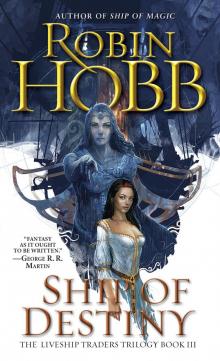 Ship of Destiny
Ship of Destiny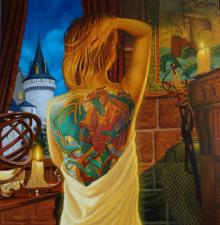 Golden Fool
Golden Fool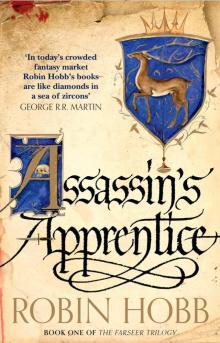 Assassins Apprentice
Assassins Apprentice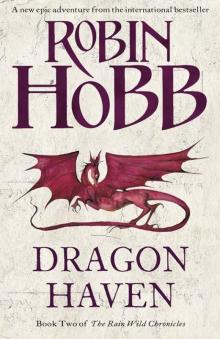 The Dragon Keeper
The Dragon Keeper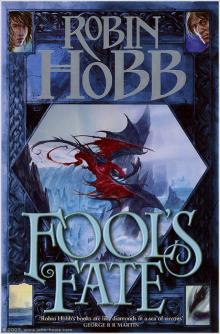 Fools Fate
Fools Fate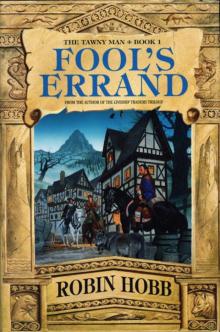 Fools Errand
Fools Errand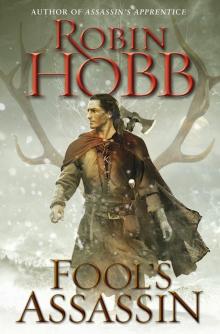 Fools Assassin
Fools Assassin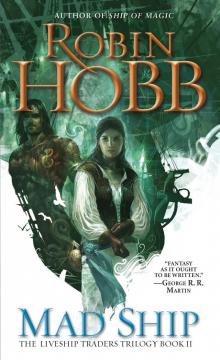 The Mad Ship
The Mad Ship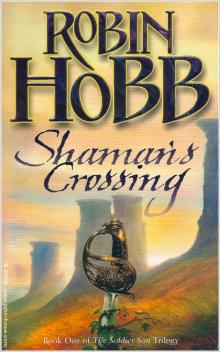 Shamans Crossing
Shamans Crossing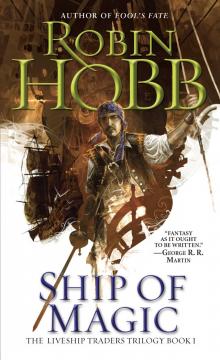 Ship of Magic
Ship of Magic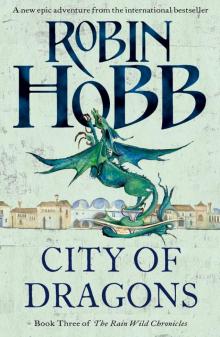 City of Dragons
City of Dragons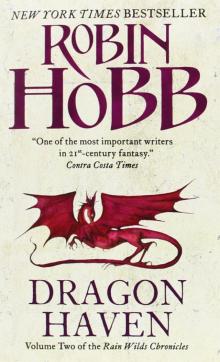 Dragon Haven
Dragon Haven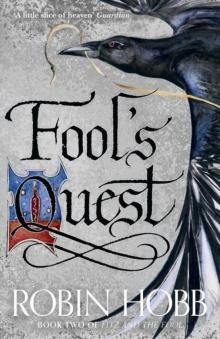 Fools Quest
Fools Quest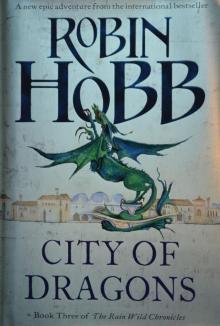 Blood of Dragons
Blood of Dragons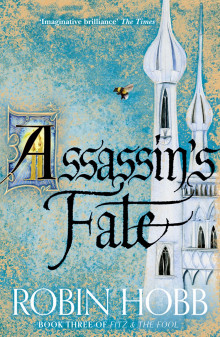 Assassin's Fate
Assassin's Fate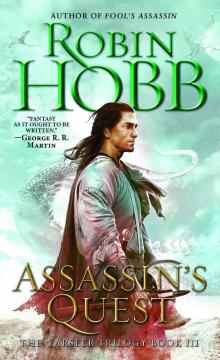 Assassins Quest
Assassins Quest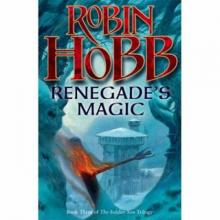 Renegades Magic
Renegades Magic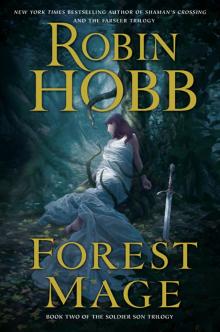 Forest Mage
Forest Mage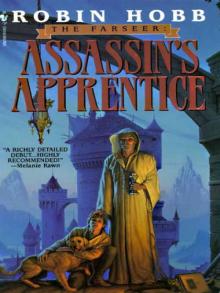 Assassin's Apprentice tft-1
Assassin's Apprentice tft-1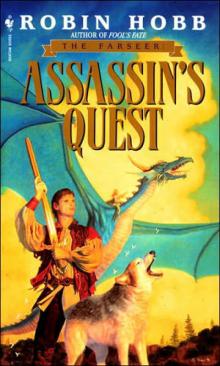 Assassin's Quest tft-3
Assassin's Quest tft-3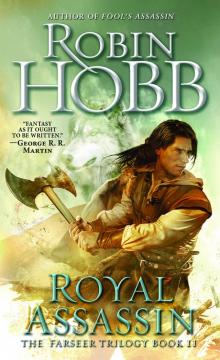 Royal Assassin
Royal Assassin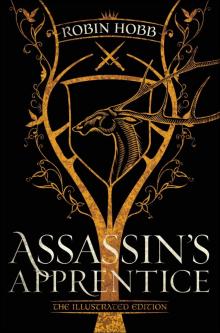 Assassin's Apprentice (The Illustrated Edition)
Assassin's Apprentice (The Illustrated Edition)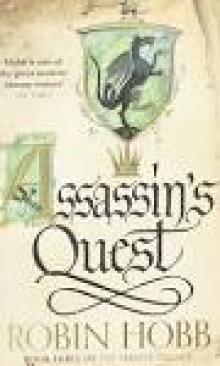 Assassin's Quest (UK)
Assassin's Quest (UK)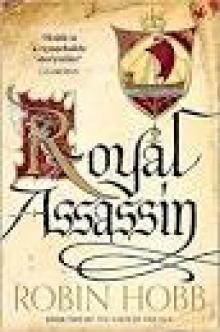 Royal Assassin (UK)
Royal Assassin (UK)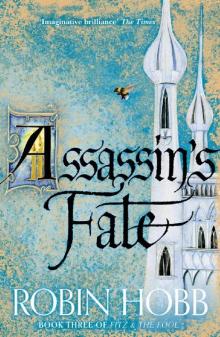 FF3 Assassin’s Fate
FF3 Assassin’s Fate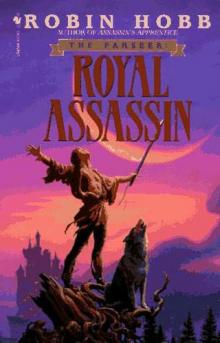 Royal Assassin tft-2
Royal Assassin tft-2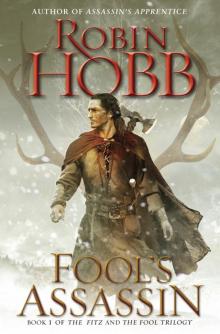 Fool’s Assassin: Book One of the Fitz and the Fool Trilogy
Fool’s Assassin: Book One of the Fitz and the Fool Trilogy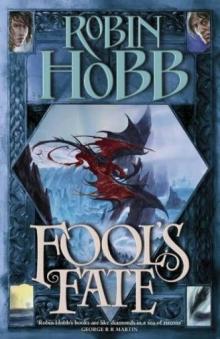 Fool's Fate ttm-3
Fool's Fate ttm-3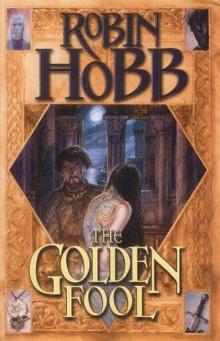 The Golden Fool ttm-2
The Golden Fool ttm-2 The Liveship Traders Series
The Liveship Traders Series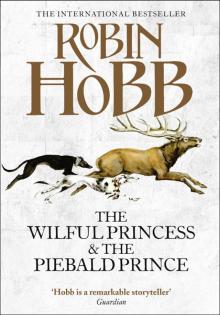 The Wilful Princess and the Piebald Prince
The Wilful Princess and the Piebald Prince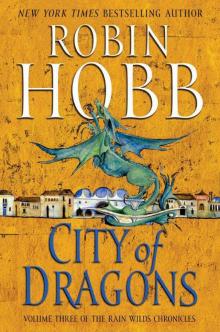 City of Dragons rwc-3
City of Dragons rwc-3 The Tawny Man 1 - Fool's Errand
The Tawny Man 1 - Fool's Errand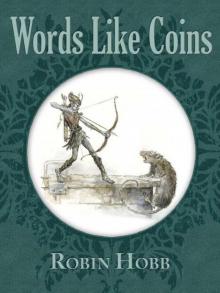 Words Like Coins
Words Like Coins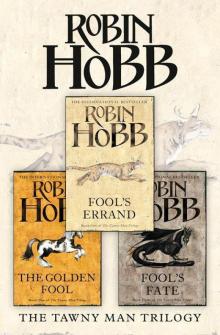 The Complete Tawny Man Trilogy Omnibus
The Complete Tawny Man Trilogy Omnibus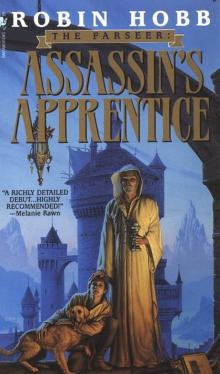 Farseer 1 - Assassin's Apprentice
Farseer 1 - Assassin's Apprentice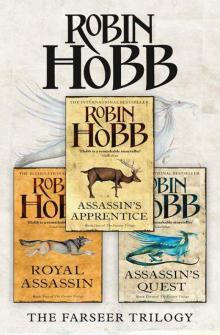 The Complete Farseer Trilogy Omnibus
The Complete Farseer Trilogy Omnibus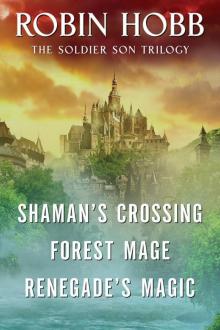 The Soldier Son Trilogy Bundle
The Soldier Son Trilogy Bundle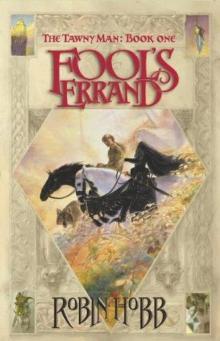 Fool's Errand ttm-1
Fool's Errand ttm-1 Blue Boots
Blue Boots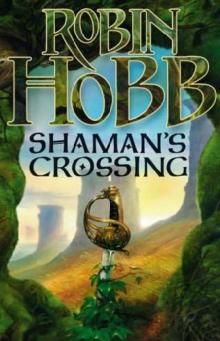 Shaman's Crossing ss-1
Shaman's Crossing ss-1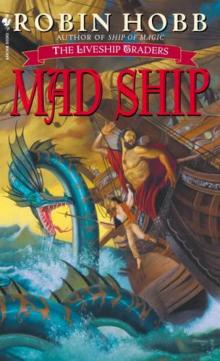 Mad Ship
Mad Ship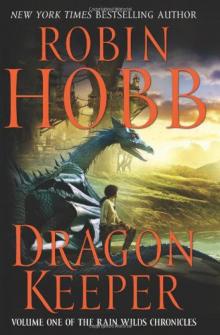 Dragon Keeper
Dragon Keeper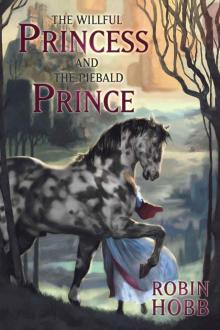 The Willful Princess and the Piebald Prince
The Willful Princess and the Piebald Prince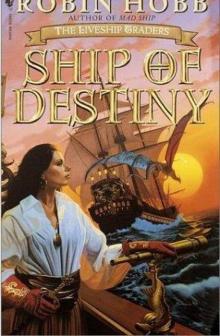 Ship of Destiny tlt-3
Ship of Destiny tlt-3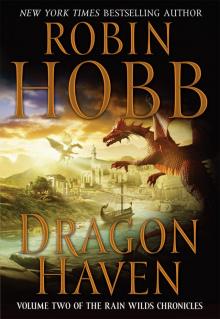 Rain Wild Chronicles 02 - Dragon Haven
Rain Wild Chronicles 02 - Dragon Haven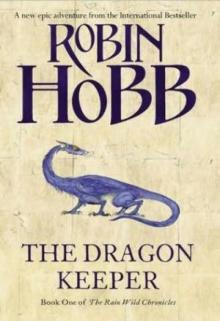 The Dragon Keeper trwc-1
The Dragon Keeper trwc-1 The Triumph
The Triumph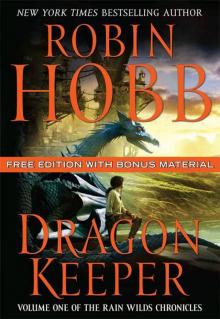 Dragon Keeper Free Edition with Bonus Material
Dragon Keeper Free Edition with Bonus Material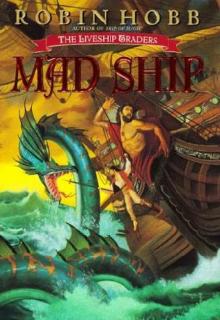 Mad Ship tlt-2
Mad Ship tlt-2 The Inheritance and Other Stories
The Inheritance and Other Stories Tawny Man 02 - Golden Fool
Tawny Man 02 - Golden Fool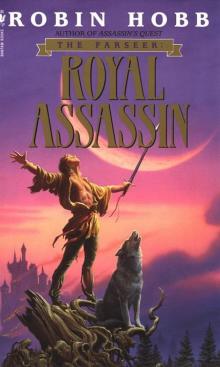 Farseer 2 - Royal Assassin
Farseer 2 - Royal Assassin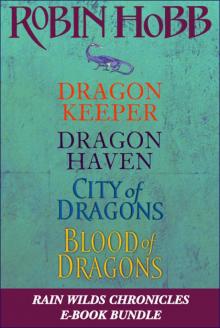 Rain Wilds Chronicles
Rain Wilds Chronicles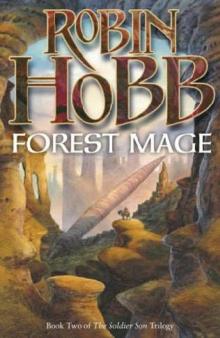 Forest Mage ss-2
Forest Mage ss-2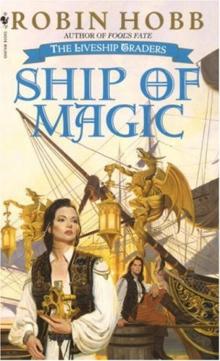 Ship of Magic lt-1
Ship of Magic lt-1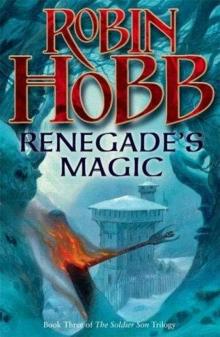 Renegade's Magic ss-3
Renegade's Magic ss-3